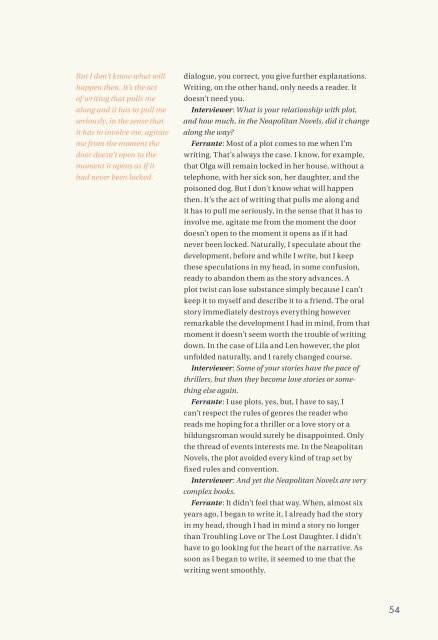magazine_final_online
Create successful ePaper yourself
Turn your PDF publications into a flip-book with our unique Google optimized e-Paper software.
But I don’t know what will<br />
happen then. It’s the act<br />
of writing that pulls me<br />
along and it has to pull me<br />
seriously, in the sense that<br />
it has to involve me, agitate<br />
me from the moment the<br />
door doesn’t open to the<br />
moment it opens as if it<br />
had never been locked.<br />
dialogue, you correct, you give further explanations.<br />
Writing, on the other hand, only needs a reader. It<br />
doesn’t need you.<br />
Interviewer: What is your relationship with plot,<br />
and how much, in the Neapolitan Novels, did it change<br />
along the way?<br />
Ferrante: Most of a plot comes to me when I’m<br />
writing. That’s always the case. I know, for example,<br />
that Olga will remain locked in her house, without a<br />
telephone, with her sick son, her daughter, and the<br />
poisoned dog. But I don’t know what will happen<br />
then. It’s the act of writing that pulls me along and<br />
it has to pull me seriously, in the sense that it has to<br />
involve me, agitate me from the moment the door<br />
doesn’t open to the moment it opens as if it had<br />
never been locked. Naturally, I speculate about the<br />
development, before and while I write, but I keep<br />
these speculations in my head, in some confusion,<br />
ready to abandon them as the story advances. A<br />
plot twist can lose substance simply because I can’t<br />
keep it to myself and describe it to a friend. The oral<br />
story immediately destroys everything however<br />
remarkable the development I had in mind, from that<br />
moment it doesn’t seem worth the trouble of writing<br />
down. In the case of Lila and Len however, the plot<br />
unfolded naturally, and I rarely changed course.<br />
Interviewer: Some of your stories have the pace of<br />
thrillers, but then they become love stories or something<br />
else again.<br />
Ferrante: I use plots, yes, but, I have to say, I<br />
can’t respect the rules of genres the reader who<br />
reads me hoping for a thriller or a love story or a<br />
bildungsroman would surely be disappointed. Only<br />
the thread of events interests me. In the Neapolitan<br />
Novels, the plot avoided every kind of trap set by<br />
fixed rules and convention.<br />
Interviewer: And yet the Neapolitan Novels are very<br />
complex books.<br />
Ferrante: It didn’t feel that way. When, almost six<br />
years ago, I began to write it, I already had the story<br />
in my head, though I had in mind a story no longer<br />
than Troubling Love or The Lost Daughter. I didn’t<br />
have to go looking for the heart of the narrative. As<br />
soon as I began to write, it seemed to me that the<br />
writing went smoothly.<br />
54


